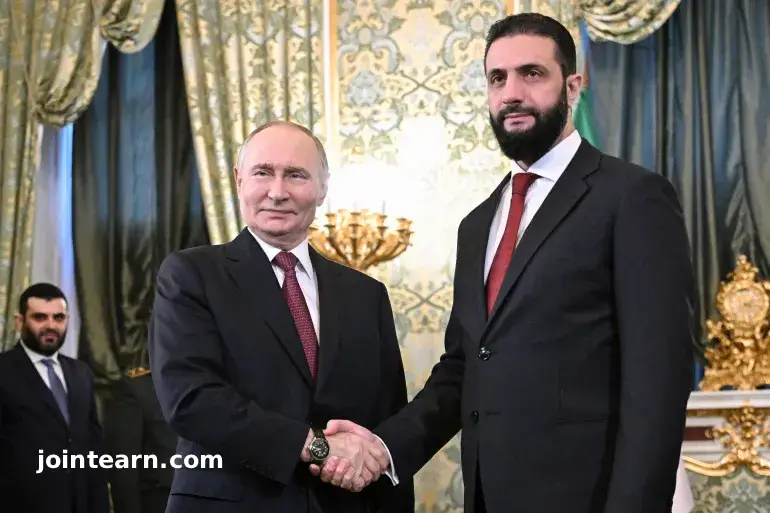
Syria’s new president Ahmed al-Sharaa has pledged to rebuild and redefine his country’s long-standing alliance with Russia, assuring Vladimir Putin that Damascus will honor all previous agreements even as it charts a new path toward sovereignty and stability after the fall of Bashar al-Assad.
Al-Sharaa’s First State Visit Marks a Diplomatic Reset
In his first official visit to Moscow since assuming the presidency, Ahmed al-Sharaa met with Russian President Vladimir Putin on Wednesday, emphasizing that Syria seeks a relationship of “independence, unity, and stability.”
“We are trying to restore and redefine in a new way the nature of these relations so there is independence for Syria, sovereign Syria, and also its territorial unity and integrity,” al-Sharaa said during their meeting in the Kremlin.
Al-Sharaa added that Damascus remains committed to all previous treaties and cooperation frameworks with Moscow, acknowledging the shared history between the two nations.
“There are bilateral relations and shared interests that bind us with Russia, and we respect all agreements made with it,” he affirmed.
From Civil War Adversaries to Strategic Partners
The meeting marks a pivotal moment in Syria-Russia relations, as both countries navigate the post-Assad political landscape. Moscow had been a key military and diplomatic backer of Bashar al-Assad throughout the Syrian civil war, providing air power, arms, and diplomatic cover in the United Nations Security Council.
However, following Assad’s ouster and subsequent exile to Russia 10 months ago, al-Sharaa’s interim government has adopted a more pragmatic stance toward the Kremlin.
According to diplomatic sources cited by Reuters and AFP, al-Sharaa may seek the extradition of Assad, although this was not publicly discussed during the televised meeting.
Putin Hails “Special Relations” and Praises Syria’s New Leadership
President Vladimir Putin welcomed al-Sharaa warmly, describing the meeting as a continuation of the “special relations” Moscow has long maintained with Damascus.
“Moscow has always acted guided by the interests of the Syrian people,” Putin said, adding that the recent Syrian parliamentary elections, the first since Assad’s overthrow, represent “a great success” for the country’s democratic transition.
Putin expressed confidence that Syria’s new government will consolidate unity and strengthen cooperation among the nation’s political factions.
“Despite the fact that Syria is currently going through difficult times, I believe this process will strengthen ties and cooperation between all political forces in Syria,” he said.
Moscow’s Influence Remains Deep
Although Assad’s regime has fallen, Russia’s footprint in Syria remains substantial. Moscow continues to operate air and naval bases on the Syrian coast and retains influence in key sectors, including energy and defense.
Syria still relies heavily on Russian oil shipments, wheat imports, and technical expertise, as well as diplomatic backing in international forums.
Al-Sharaa acknowledged this reality in a recent interview with CBS, saying:
“Russia has close and longstanding relations with Syria, which relate to the basic structure of the state and to energy and food, for which Syria depends partly on Russian supplies, as well as some old strategic interests.”
For Moscow, maintaining a foothold in Syria ensures both regional influence and access to the Mediterranean through the Tartus naval base and Khmeimim airbase, which have been vital assets since Russia’s military intervention in 2015.
The Challenge of Redefinition
Analysts suggest that al-Sharaa’s call to “redefine” relations may reflect a desire to move away from dependency and toward a more balanced partnership.
“While al-Sharaa wants to maintain strong ties with Moscow, he also wants to assert Syria’s independence from the kind of political control that marked the Assad era,” said political analyst Karim Haddad of the Middle East Institute.
This strategy may also signal a diplomatic repositioning — Syria attempting to rebuild ties not only with Russia but also with regional and Western powers after years of isolation.
Economic Reconstruction and Political Legitimacy
Rebuilding Syria’s shattered infrastructure and economy remains one of al-Sharaa’s top priorities. With much of the country in ruins after 13 years of civil war, foreign investment and reconstruction aid are essential.
Moscow’s participation will be key to this effort, particularly in energy, transport, and agriculture, areas where Russian companies have previously secured major contracts.
At the same time, al-Sharaa’s administration is working to secure international legitimacy through transparent governance and political reforms. The recent elections, though criticized by some observers for limited inclusivity, were viewed by Moscow as a positive step forward.
Regional and Global Repercussions
The Syria-Russia partnership has broad implications across the Middle East. Moscow’s continued involvement provides it leverage in regional security dynamics — from Iran and Turkey’s roles in northern Syria to U.S. influence in the east.
Experts note that al-Sharaa’s government may seek to mediate between competing powers rather than rely exclusively on any one ally.
“Al-Sharaa appears to understand that Syria’s future stability depends on diversification — maintaining Russia as a partner, but also re-engaging the Arab world and possibly the West,” Haddad said.
Outlook: A New Chapter or Old Patterns?
Whether this new era of diplomacy leads to genuine sovereignty or merely rebranded dependency remains to be seen.
For now, both Putin and al-Sharaa are framing the relationship as a renewal rather than a rupture — a continuation of strategic cooperation adapted to new realities.
“Syria is ready to build a future that honors its independence and its friends,” al-Sharaa declared as the meeting concluded.
As the Syrian leader departed Moscow, analysts agreed that the future of Syrian-Russian relations will shape not only Syria’s recovery but also the balance of power in the Middle East for years to come.


Leave a Reply